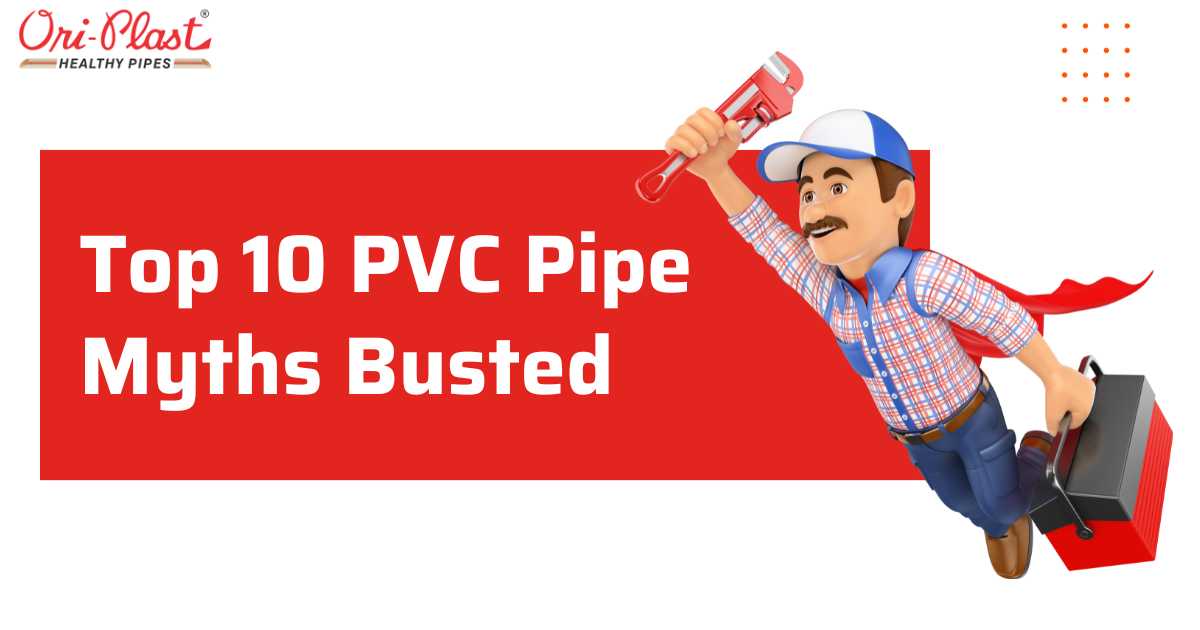Top 10 PVC Pipe Myths Busted
Are you embarking on a plumbing or DIY project? PVC pipes are likely to be a part of your plan. PVC, or polyvinyl chloride, pipes are known for their versatility and cost-effectiveness, but there are numerous myths and misconceptions surrounding them. In this comprehensive article, we'll debunk the top 10 PVC pipe myths and separate fact from fiction. Let's dive in!
Myth 1: PVC Pipes Are Not Durable
The Truth: PVC Pipes Are Incredibly Durable
One common myth suggests that PVC pipes are prone to damage and break easily. This couldn't be further from the truth. PVC pipes are incredibly durable and resistant to wear and tear. They can withstand a wide range of environmental conditions, making them ideal for both underground and above-ground applications. PVC pipes are built to last for decades, and their low maintenance requirements make them an excellent choice for any project.
Myth 2: PVC Pipes Are Harmful to the Environment
The Truth: PVC Pipes Are Environmentally Friendly
There's a misconception that PVC pipes harm the environment due to their chemical composition. However, PVC is one of the most environmentally friendly materials for piping. It is recyclable and has a long lifespan, reducing the need for constant replacements. PVC pipes also require less energy to produce, further minimizing their environmental impact. When it comes to sustainability, PVC is a top choice.
Myth 3: PVC Pipes Are Not Safe for Drinking Water
The Truth: PVC Pipes Are Safe for Drinking Water
Safety is a primary concern when it comes to water pipes. Some people wrongly believe that PVC pipes are not suitable for carrying drinking water. In reality, PVC pipes are approved by health agencies worldwide for water transportation. They do not leach harmful chemicals into the water, ensuring safe and clean drinking water for your home.
Myth 4: PVC Pipes Are Susceptible to Chemical Corrosion
The Truth: PVC Pipes Are Resistant to Chemical Corrosion
Another myth suggests that PVC pipes can corrode when exposed to various chemicals. PVC is inherently resistant to chemical corrosion, making it a perfect choice for industrial applications where exposure to chemicals is common. This resistance helps maintain the integrity of the pipes, ensuring long-term reliability.
Myth 5: PVC Pipes Are Not Suitable for Hot Water
The Truth: PVC Pipes Are Suitable for Hot Water
PVC pipes are not limited to cold water use. They can handle hot water effectively without deforming or losing their structural integrity. With proper insulation, PVC pipes can safely carry hot water, making them versatile for various plumbing needs.
Myth 6: PVC Pipes Are Difficult to Install
The Truth: PVC Pipes Are Easy to Install
Installing PVC pipes is a straightforward process. Their lightweight nature makes handling and installation easy, even for DIY enthusiasts. PVC pipes require minimal tools, and their connections are simple to secure. With a little guidance, you can successfully install PVC pipes for your projects.
Myth 7: PVC Pipes Are Not Versatile
The Truth: PVC Pipes Are Incredibly Versatile
PVC pipes are not limited to one type of project. They are versatile and can be used in plumbing, irrigation, drainage, and even in construction. Their adaptability and compatibility with various fittings and accessories make them a top choice for a wide range of applications.
Myth 8: PVC Pipes Are Expensive
The Truth: PVC Pipes Are Cost-Effective
Contrary to the myth that PVC pipes are costly, they are one of the most cost-effective options available. The initial investment in PVC pipes is often lower than other materials, and their durability means fewer replacements and maintenance costs over time. In the long run, PVC pipes save you money.
Myth 9: PVC Pipes Are Not Resistant to UV Rays
The Truth: PVC Pipes Are UV-Resistant
Some believe that PVC pipes can't withstand exposure to sunlight. However, PVC pipes are formulated to be UV-resistant. They won't deteriorate when exposed to the sun's rays, making them suitable for outdoor applications.
Myth 10: PVC Pipes Are Prone to Leaks
The Truth: PVC Pipes Are Leak-Resistant
PVC pipes are designed to provide leak-resistant connections. When installed correctly with the appropriate fittings and adhesives, PVC pipes form tight, reliable seals that prevent leaks. With proper installation, you can trust PVC pipes to deliver leak-free performance.
Conclusion
In summary, PVC pipes are an excellent choice for various applications, and many myths surrounding them are far from accurate. They are durable, environmentally friendly, safe for drinking water, and resistant to chemical corrosion. PVC pipes can handle hot water, are easy to install, and are incredibly versatile. They are also cost-effective, UV-resistant, and provide leak-resistant connections. So, when you're planning your next plumbing or construction project, rest assured that PVC pipes are a reliable and practical choice.
Remember, using quality PVC pipes and following proper installation guidelines will ensure the best results for your projects. Don't let these myths deter you from harnessing the many benefits that PVC pipes have to offer.

